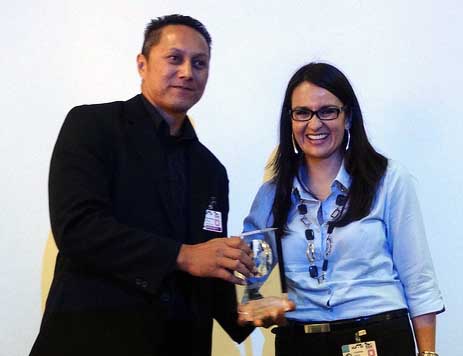AUCKLAND (Pacific Media Watch): Pacific Island communities face huge benefits by developing "their own solutions" - and not relying on help from others to advance their communities' digital infrastructure, says a central internet organisation.
“I believe the power is in their [Pacific Islanders’] ideas and the power is in the knowledge they have about the real situation, and I think it’s very difficult for people, even for those that are very oriented to help them and thinking they are doing the right thing to impose solutions,” Sylvia Cadena told Pacific Media Watch .
She is the project officer of the Information Society Innovation Fund (ISIF) Asia, which awards grants of up to A$30,000 for internet development in the Asia-Pacific region.
ISIF is a programme run by the Brisbane-based Asia Pacific Network Information Centre (APNIC), which is the regional internet registry for the Asia-Pacific region. Among other things, APNIC provides technical training and allocates IP addresses in the region.
"I think that the solutions have to come from their own thinking and their own understanding of the situations."
"That’s where the challenge is because it’s a bit difficult to break a little bit from that relationship of some other people telling them what to do.
"Breaking the cycle and making decisions about their own contexts and what solutions they are going to implement in those contexts is very important," Cadena explained.
Successful projects
Although there are examples of successful and innovative Pacific applicants, Cadena said she wishes there were more potential Pacific grant recipients.
“We are actually looking for more applicants from the Pacific. It’s not that easy to find them, because they move in their own context.
"You know, they talk to each other a lot. Probably with a lot of people from New Zealand, but maybe not outside that environment,” the Colombia-native told Pacific Media Watch during the recent Nethui internet conference in Wellington.
Cadena highlighted two Pacific projects that ISIF has awarded grants and awards to recently:
Firstly, the Internet Niue project, which uses the income from the domain name .nu to provide internet access across the tiny island country, received an ISIF Asia award in 2011. 
There is today free wireless internet access in almost the entire country, making Niue the world’s first “Wi-Fi nation”.
Secondly, the Pacific Island Schools Connectivity, Education and Solar (PISCES) project in the Chuuk Islands of the Federated States of Micronesia, which has improved internet access and taught locals how to use the internet.
The project which won an ISIF grant, has a particular emphasis on providing internet access to schools. In addition, it also provides solar power to remote island communities.
Future applications
Cadena is hopeful that there will be more projects like Internet Niue and PISCES in the future, and she encouraged potential applicants to not wait until the “perfect stars align” to submit an application for an ISIF grant.
“The time is now...We have money now. You never know for next year [if] we’re going to have the same support and buy-in from donors and sponsors, so please don’t let it to the last minute.”
The deadline for applying for this year's ISIF Asia grant is August 9.
“Believe in yourself and believe in your knowledge of what you need. I think the Pacific Islanders are the ones that have the knowledge about what the future of the Pacific islands is, and we believe in you and we want to hear about your ideas and support you all the way,” the ISIF project officer said.
There is no doubt that improving internet access and teaching people in the Pacific about the internet will be hugely beneficial, according to Cadena.
“I think that the benefits of allowing people to live where they want to be, to stay in their islands and preserve their culture, and have a good job opportunity and developed professionally without having to leave behind everything they love and know is a very important benefit from bringing internet technology to isolated areas.”
“We just have to be very smart on how we do it to give the same possibilities to people everywhere with no matter how far or how much water is in between. People should have the same opportunities, and that’s what access is all about,” she said.
Below is a transcript of the interview:
Daniel Drageset: Sylvia Cadena of APNIC. What is APNIC and what do you do?
Sylvia Cadena: APNIC is the Asia Pacific Network Information Centre. We allocate IP addresses and ASN number so the internet providers around the Asia-Pacific region can provide access to the general public.
We got 56 economies in the region and we provide technical training and capacity building assistance for governments, ISPs [Internet Service Providers] and universities that are connected to the internet.DD: What challenges does APNIC face in the Pacific?
SC: The challenges vary from sub-region to sub-region and in many cases are related to the cultural barriers and the regulatory frameworks that are not harmonised in different countries in the region. Talking about collaborative spaces and collaboration in actual telecommunications is a bit complicated in the Asia-Pacific, because a lot of the regulatory framework don’t match.
But part of the work we do is trying to make sure that the decision-makers have enough information available for them at the technical level to make the right decisions. And we also provide training to people that are on the field connecting universities, connecting government departments, connecting mobile operators, connecting internet providers, to make sure they understand what are the constraints and what are the needs for the collaboration to happen and what are the benefits behind it.DD: What is the best way of empowering Pacific Islanders?
SC: I believe the power is in their ideas and the power is in the knowledge they have about the real situation, and I think it’s very difficult for people, even for those that are very oriented to help them and thinking they are doing the right thing to impose solutions.
I think that the solutions have to come from their own thinking and their own understanding of the situations, and that’s where the challenge is because it’s a bit difficult to break a little bit from that relationship of some other people telling them what to do, and breaking the cycle and making decisions about their own contexts and what solutions they are going to implement in those contexts is very important.DD: How can you facilitate innovation among the Pacific Islanders?
SC: What we have been doing through the Information Society Innovation Fund, which is a small grants and awards programme that APNIC is coordinating on behalf of a group of partners, is that we have been providing sid money, sid funding – that is small grants – so people can actually test their own ideas without prudent risks.
It’s some money that they can basically use to implement and test their innovative approaches and see what happened and report about that. What we do with the grant recipients is that we coach them and we mentor them along the process to make sure that they are able to communicate the findings of the research, the lessons learned through their experience so that others can benefit from it. Along the way we have been discovering the needs they have in terms of specific knowledge on for example grant proposal writing, or budget management or administrative skills.
And we have been trying to support them to provide some skills and knowledge that will be useful for them not only to administer an ISIF grant, but to administer or to submit proposals and negotiate proposals with bigger donors that are giving larger amounts of funding. And also to expose them to alternative funding mechanisms that they maybe haven’t even considered that are available for them to implement their projects and ideas.DD: So what is your message to Pacific Islanders who want to apply for this grant? In order to realise the project, what is your message?
SC: I think that the message is that the call for applications is open until August 9, that the time is now, that you never know what’s going to happen next year. We have money now. You never know for next year [if] we’re going to have the same support and buy-in from donors and sponsors, so please don’t let it to the last minute, please don’t wait for the perfect stars to align to have everything in order.
Sometimes it’s just a matter of dive in, jump in the water, and send a proposal. The proposal is basically trust in your own ideas. Believe in yourself and believe in your knowledge of what you need. I think the Pacific Islanders are the ones that have the knowledge about what the future of the Pacific islands is, and we believe in you and we want to hear about your ideas and support you all the way.DD: What examples do you have of successful Pacific projects?
SC: At the moment we are funding a project in the Chuuk Islands in [The Federated States of ] Micronesia. The project is called the PISCES [Pacific Island Schools Connectivity, Education and Solar] Project, and is connecting schools to the internet, but also addressing issues about power, solar power basically, and a lot of capacity building around how community groups interact with this technology.
They have a very interesting blog. Another interesting project we awarded back in 2011 is the Internet Niue project, which is a very unique initiative and very unique mechanism to trade the benefits of selling a domain name that people are interested in – which is the dot nu – to use those funds to implement access for all the islanders for free.
There are other initiatives in the Pacific that haven’t been awarded by ISIF, but that are currently underway, and you are welcome to visit our website and join our mailing lists to meet them. But we are actually looking for more applicants from the Pacific.
It’s not that easy to find them, because they move in their own context. You know, they talk to each other a lot. Probably with a lot of people from New Zealand, but maybe not outside that environment. One of the reasons of me being here in Nethui is to try to approach them and try to find out what we can do, and where are they and how can we reach out to them.DD: And finally Sylvia, what benefits do you envisage by improving internet access to the Pacific?
SC: I think that the benefits of allowing people to live where they want to be, to stay in their islands and preserve their culture, and have a good job opportunity and developed professionally without having to leave behind everything they love and know is a very important benefit from bringing internet technology to isolated areas.
I don’t think it only applies to islands. I also think it applies to communities living up in the mountains, you know, just 12 hours on a bus or something to get there. It’s about being in the place you want to be and doing the things you want to do, and I believe that internet gives you that possibility.
We just have to be very smart on how we do it to give the same possibilities to people everywhere with no matter how far or how much water is in between. People should have the same opportunities, and that’s what access is all about."
This work is licensed under a Creative Commons Attribution-NonCommercial 3.0 New Zealand Licence.
ASIA PACIFIC NETWORK INFORMATION CENTRE
GRANTS AND AWARDS:
Information Society Innovation Fund Asia
Previous Pacific winners include Internet Niue (award) and the Pacific Island Schools Connectivity, Education and Solar (PISCES) project (grant)
Using internet to make people stay on the island




